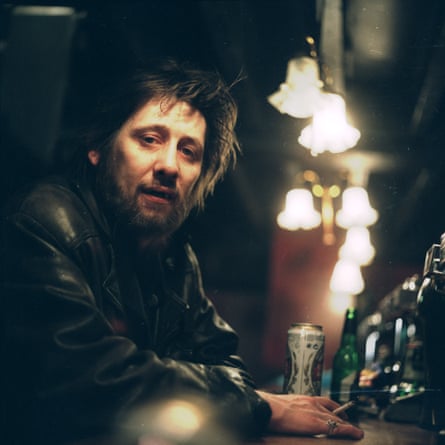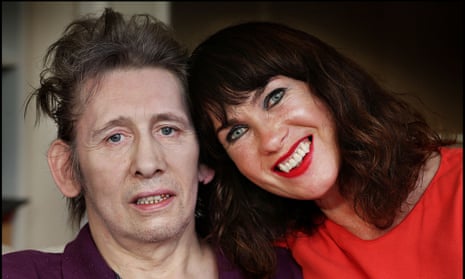“I believe in miracles,” Shane MacGowan said recently in response to a question about his religious beliefs from the Irish radio show host, Miriam O’Callaghan. “I’ve seen miracles happen in my life. It’s a miracle every morning when you wake up.”
In MacGowan’s case, this oft-repeated spiritual mantra has a particular resonance. Having turned 60 on Christmas Day, he has defied the dire predictions of both doctors and concerned friends regarding his doggedly self-destructive lifestyle over the last four decades. In short, Shane MacGowan is alive and (relatively) well despite himself, despite the years of dissolution that began in his teens and continued apace through his years as a punk “face” in the late 1970s, the halcyon days of his London-Irish group, the Pogues, in the 1980s, and the long years since when his appetite for excess dulled both his songwriting skill and his ability to perform.
What is also clear with each passing year, however, is that the great MacGowan songs endure, from the bruised romanticism of A Pair of Brown Eyes to the brutal realism of The Old Main Drag, his evocation of life among the teenage rent boys that once haunted Piccadilly Circus by night. Not only that, but they possess a visceral authenticity that belongs to a time before the onset of cultural gentrification, when rock music was peopled with outsiders and misfits. As one of them, MacGowan wrote with acuity about the lives of London’s human flotsam and jetsam.
“His songs, even though they are hard-edged, always have empathy for the characters in them,” says Bobby Gillespie, lead singer of Primal Scream. “He has a brutal eye for detail and he can tell a story in a concise but almost cinematic way using these amazing images that just hit you in the heart with their tenderness and emotion.”
On Monday evening, in celebration of MacGowan’s 60th birthday and, by extension, his miraculous powers of survival, a host of fellow performers including Gillespie, Nick Cave and Cerys Matthews will grace the stage of the National Concert Hall in Dublin to sing his songs backed by a band that will include a few ex-Pogues as well as the Hollywood actor Johnny Depp on guitar. Like Cave, Depp is a close friend of MacGowan’s who directed and appeared in the video for That Woman’s Got Me Drinking, and considers Shane “... a special being and one of the most important poets of the 20th century”.
According to MacGowan’s longtime partner, Victoria Mary Clarke, other surprises are planned for the concert, but even had Bob Dylan been able to make it (he had a prior engagement), nothing will be more eagerly awaited than the sight of MacGowan himself appearing onstage to deliver his singular songs in his inimitable way.
“Shane always seems to be channelling something when he sings,” says Cave. “Some kind of energy that exists beyond himself. I saw him at a soundcheck at a festival in France, and he walked up to the mike and stood with his hands in his pockets and sang A Pair Of Brown Eyes, and for the few of us that were there time stood still. There was so much emotional power coming out of him, without him doing a fucking thing, that you had to question your ideas of divinity.” Five hours later, though, MacGowan was unfit to perform. “That is the other side of him, of course,” says Cave. “But we love that too.”

It has been a while since MacGowan played a live gig, having been wheelchair-bound, on and off, since a heavy fall badly damaged his back a few years ago. “I’m concentrating on my health at the minute,” he told O’Callaghan, and to this end he has given up spirits and now only drinks wine. This is progress of a sort, given his marathon aversion to what he considered the curse of sobriety. “Why should I hold back?” he retorted, when I expressed concern about the extent of his self-destructive lifestyle way back in 1989. “I mean, I’ve got one life to live. It’s my choice to die when I want to.”
As the years went by, however, and several of his acquaintances did in fact die from alcohol and drugs, it seemed almost inevitable that MacGowan would follow suit, particularly when he began to attract the perhaps inevitable coterie of equally dissolute hangers-on that gravitate like ambulance chasers to the famously self-destructive. On YouTube you can view a few interviews with him in the 90s in which he seems barely able to speak, never mind answer questions. But like Keith Richards and Iggy Pop before him, MacGowan has proved himself to be one of the great rock’n’roll survivors – bruised, bloody but unbowed, as he enters his seventh decade.
I first crossed paths with him when he was working in a record shop called Rocks Off in central London in 1976. If memory serves me well, he insisted I buy the debut single of a group I had never heard of: New Rose by the Damned. Unbeknown to me at the time, it was the first British punk record. As I later realised, MacGowan was one of the early faces on the London punk scene. As a wired 19-year-old, he was captured for posterity dancing furiously in a Union Jack jacket on the floor of the fabled Roxy Club in Covent Garden. “I was happy during punk, incredibly happy,” he told me wistfully a decade later. “I didn’t regard it as chaos; to me it was natural living.”
In 1981 his post-punk band the Nips released a single called Gabrielle, its swagger and edgy romantic lyricism the earliest intimation of what was to follow. Then, sometime in 1984, I witnessed the Pogues, then still called Pogue Mahone (the Irish for “kiss my arse”) in a Brixton bar. Apart from the female bass player, Cait O’Riordan, who exuded icily cool punk attitude in spades, there was nothing remotely glamorous about them. I described them back then as “a motley bunch of Anglo-Irish swiggers with attitude, kitted out in secondhand suits their grandfathers might have worn, playing songs their Irish aunts and uncles sang at weddings, parties, anywhere”.
Once I had gotten over the shock of hearing old-fashioned Irish ballads like The Auld Triangle and Poor Paddy being given a good kicking, I began to take in MacGowan’s originals – raw and rowdy punk-fuelled songs like Transmetropolitan and The Boys from the County Hell. To me, and thousands like me, they seemed both old and new, familiar and disorientating. They were immigrant songs: London-Irish rather than purely Irish, as dependent for their visceral insider reportage on the primal influence of the Sex Pistols as on the Dubliners. Back then, MacGowan often evoked a rural, pre-Celtic Tiger Ireland that was already disappearing, but his lyrics spoke to me even more directly of the life I lived back then – the crappy jobs, the dole queue, the casual racism, but also the more illicitly exciting London of semi-legal squats, cheap gigs, and all-night shebeens and dive bars.
Like the plays of Martin McDonagh, who cites the Pogues as a formative influence, MacGowan’s songs arose out of his lived experience of both rural Ireland and inner-city London. Thus, unashamedly romantic descriptions of home often merge with images of urban alienation, oppression and violence.
He was an outsider in England from the moment he arrived as a youngster plucked from rural Tipperary on a scholarship to Westminster School. Constantly bullied for his looks and accent, he spent long hours, he later told me, wandering alone in Soho, a curious teenager drawn to the seedy undertow of those pre-gentrified streets where the lure of peep shows and strip joints still held sway. All he experienced, saw and overheard somehow lodged in his brain, and came out again, transformed, in the songs he wrote on the scraps of paper that littered his flat in King’s Cross alongside the empty bottles and scattered records.
One of those songs, of course, has since entered the public consciousness in the most surprising way. The epic and brutally romantic sway of Fairytale of New York has become the festive song for those of us who can’t abide festive songs, and no amount of annual over-exposure can dull the achingly regretful sway of the couplet he trades with the late Kirsty MacColl – “I could have been someone/ Well, so could anyone.”
“I regard Shane as easily the best lyric writer of our generation,” says Nick Cave. “He has a very natural, unadorned, crystalline way with language. There is a compassion in his words that is always tender, often brutal, and completely his own.” Whatever the ragged contours of Shane MacGowan’s epically unruly life, it is his tender and brutal songs that will live on after he, and those of us who had the good fortune to experience him in full creative flow, are long gone.

Comments (…)
Sign in or create your Guardian account to join the discussion